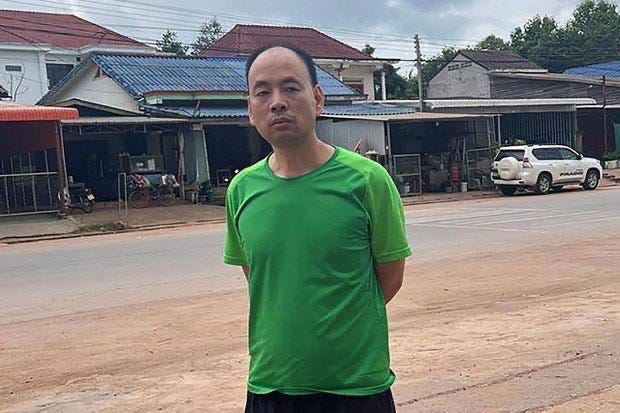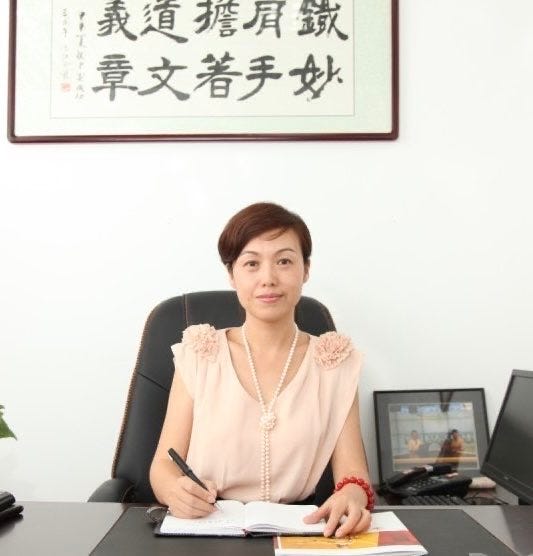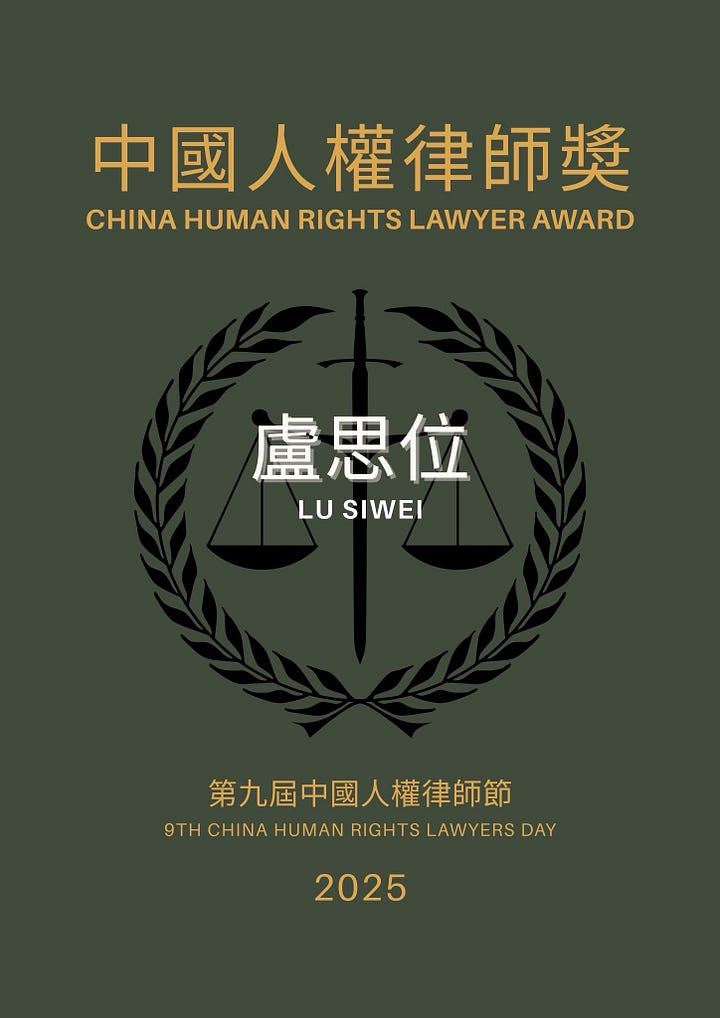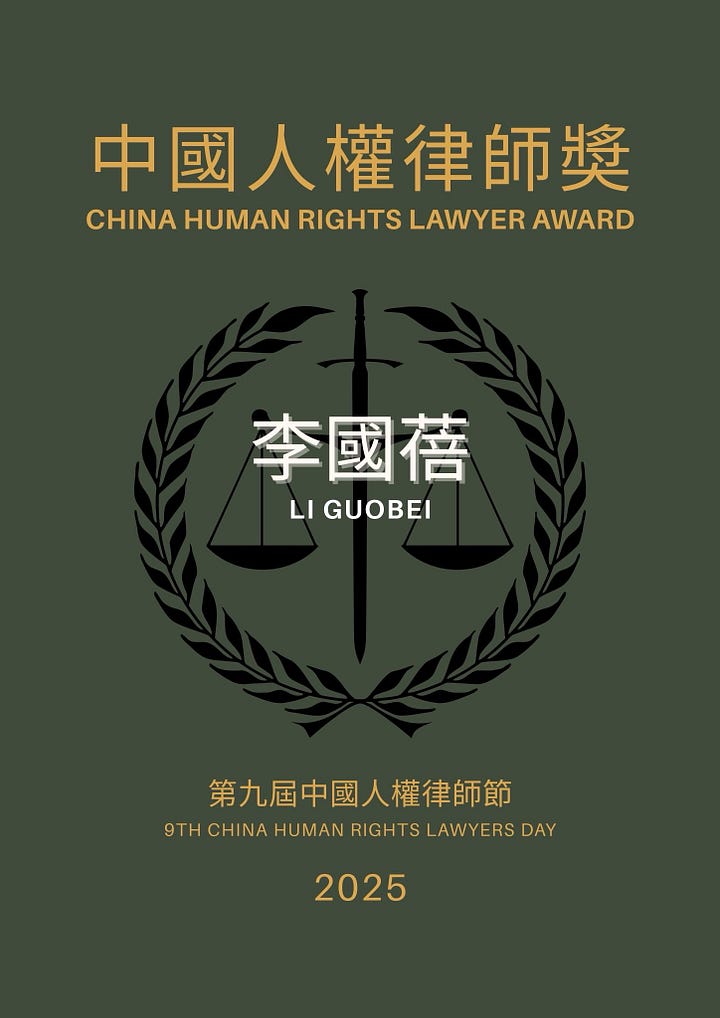Ten years ago today, the Chinese Communist Party (CCP) began a crackdown on human rights lawyers that resulted in the detention of over 300 Chinese human rights lawyers and activists and conviction of 16 people for their rights defense work. This July 9th, 2015 crackdown, which came to be known as the “709 Crackdown,” is to date one of the Chinese government’s most significant attacks on Chinese human rights causes. For merely performing what they believed to be their civic duty to defend victims of human rights abuses, lawyers were detained incommunicado for extensive periods, their families were baselessly harassed, and many were sentenced to prison on vague charges such as “subversion of state power.” Indeed, the CCP’s limited tolerance for—and pressure on—human rights lawyers has only intensified in the decade since. Yet such continued backsliding of human rights has been bravely resisted by lawyers who remain key defenders of human rights. This year, Li Guobei and Lu Siwei have been named as recipients of the China Human Rights Lawyer Award in honor of their ongoing efforts to defend justice and human rights in China.
What was the 709 crackdown?
On July 9, 2015, the Chinese government orchestrated a coordinated national crackdown against human rights advocates, interrogating over 300 lawyers and activists. Although government suppression of human rights lawyers had intensified beginning as early as 2014, the large-scale campaign against human rights lawyers severely restricted their crucial work and deterred others from speaking up against human rights abuses. The targets included democracy and religious freedom activists, rights defense lawyers, and even their families who were uninvolved in the work. This ongoing manipulation of “rule of law” became known as the “709 crackdown,” or merely “709,” for the date the crackdown began.
As a result of 709, at least 16 rights advocates were convicted on charges of “subversion of state power,” “inciting subversion,” or “picking quarrels and provoking trouble.” Many served extensive prison sentences and are still prevented from leaving the country, or face additional restrictions on their rights and freedoms.
10th Anniversary Updates on Targeted Lawyers
In 2020, HRIC released a chart of updates on detained human rights lawyers and rights activists. Today, none of those listed have been able to return to a normal life. Even for those who have been released, the ramifications of their imprisonment on their health and wellbeing is exacerbated by the government’s ongoing surveillance.
Hu Shigen: Released. Hu was released in March 2023 after a 7.5 year imprisonment. His health has deteriorated due to his lengthy prison term without receiving medical care. He was previously imprisoned for 16 years for democracy and labor advocacy.
Zhou Shifeng: Deprivation of political rights. Zhou completed his 7-year sentence in September 2022. He was detained incommunicado for a year after declaring his intention to establish a “China Lawyer’s Rights Defense Fund” to help the families of detained lawyers access financial support. After the sentence, he remains under an additional punishment—a five-year “deprivation of political rights”—which continues as of July 2025, denying him his right to vote, freedom of speech, freedom of assembly, and even freedom of association beyond the prison walls.
Wu Gan: Deprivation of political rights. Wu was released in May 2023. His father reported in March 2019 that Wu suffered from deteriorating health and even a possible spinal injury due to mistreatment and torture in detention. As of July 2025, he remains under the five-year “deprivation of political rights.”
Yu Wensheng: Serving another draconian sentence for human rights advocacy. Yu Wensheng was released from his previous sentence from the 709 crackdown—a four-year sentence following a secret trial—in March 2022. Yet in April 2023, Yu Wensheng and his wife, Xu Yan, were detained by police en route to meet with European officials visiting China. They were charged nebulously with “picking quarrels and provoking trouble” and “inciting subversion of state power,” and detained at length. In October 2024, after significant delays, Yu Wensheng was again sentenced to three more years in prison. His appeal was denied in January 2025. He continues to serve this sentence as of July 2025. Many human rights advocates and international bodies—including US Department of State Spokesperson Matt Miller—have condemned Yu Wensheng’s continued mistreatment by Chinese authorities, as he and his wife were charged with “colluding with foreign forces” despite never even making it to the meeting.
Jiang Tianyong: House arrest. Jiang was released in February 2019 and was subjected to house arrest and extensive surveillance.
Xie Yang: Indefinite pretrial detention. Xie Yang has been in pretrial detention for over three years on “subversion” charges. Authorities continue to extend his detention illegally and indefinitely. He was initially arrested as part of the 709 crackdown in 2015 and subjected to inhumane torture such as sleep, food, and water deprivation, beatings, and death threats against his family. He was released on bail in December 2017 and re-arrested in 2021 for supporting a schoolteacher who had been forced into psychiatric detention.
Yin Xu’an: Released. Yin Xu’an was released after his 4.5 year prison sentence on November 22, 2023. He continues to be tightly surveilled by security officers and CCTV.
Never Giving Up: Outstanding Human Rights Defenders Li Guobei and Lu Siwei
Li Guobei and Lu Siwei are both fearless human rights defenders who have faced personal ramifications for their work in criticizing police mistreatment, calling out government wrongdoing, and representing other activists in court. This year, in honor of their commitment to the field of human rights, they have both been recognized as the 2025 recipients of the China Human Rights Lawyer Award. HRIC seeks to spotlight their incredible work and share their stories of perseverance in the face of government censorship and opposition.
Fearless Defense of Rights Advocates
Despite the risk of police retaliation for her high-profile legal defense work, Li Guobei has fearlessly represented prominent human rights activists like Li Qiaochu, who was tried on charges of “inciting subversion of state power” for speaking out about police mistreatment of her partner, activist Xu Zhiyong. When Li Guobei was denied entry to Li Qiaochu's closed door trial in 2023, the authorities falsely claimed that she refused to represent Li Qiaochu; in reality, the authorities themselves had baselessly dismissed Li Guobei. A fellow human rights lawyer, Wu Shaoping, stated that such a dismissal was partly due to Li Guobei’s impressive record as a human rights defender and outspoken advocate, saying that “while the authorities are restricting, depriving and controlling lawyers’ rights, lawyer Li Guobei still dares to speak out.”
After the 709 Crackdown, Lu Siwei stepped up to represent human rights attorneys facing criminal charges, including Chen Jiahong, Yu Wensheng, Qin Yongpei, and Wang Quanzhang. He was known for taking on sensitive cases, including that of Chengdu activists who had attempted to commemorate the Tiananmen Massacre. In 2020, Lu defended one of the 12 Hong Kong activists jailed in mainland China while attempting to flee to Taiwan, a highly politically sensitive case. In retaliation, the Chinese government stripped him of his law license. When he went to the district court to sue the judicial department that had revoked his license, he was physically pushed to the ground by police, who knelt on his throat, restricting his breathing.
Speaking Out Against Detention Mistreatment
After the 709 crackdown, Lu Siwei was a vocal advocate on behalf of his fellow lawyers, and led a public signature campaign to urge the National People’s Congress to investigate allegations of torture of 709 detainees. In 2020, he was subject to disciplinary proceedings for advocating on behalf of his client, activist Chen Jiahong, who had been subject to inhumane and degrading treatment while detained.
Li Guobei is also known as an outspoken advocate for detention conditions. In 2024, Li Guobei represented lawyer Zhang Wenpeng, who was tortured and beaten by a police officer while in detention. Li Guobei submitted a complaint letter about the mistreatment, demanding an investigation for abuse of power and reporting serious obstruction of justice, yet no action was taken by the authorities. Li also published detailed articles exposing the extent to which the government has interfered in her detention center meetings with Zhang Wenpeng and efforts to defend him. In 2025, Li Guobei drew attention to the human rights violations her client Xie Yang had suffered in detention. Li Guobei wrote publicly in April 2025 about the humiliating physical exams Xie Yang was forced to undergo simply to speak with her.
Advocating for Freedom of Speech
Li Guobei has harshly criticized the Beijing Judicial Bureau and Bar Association for their abuses of power in retaliating against lawyers critical of the government by preventing their firms from passing annual inspections. When lawyer Fang Xiangui came under fire from the administration for criticizing Xi Jinping overseas, Li Guobei took to Weibo to express her outrage at such unjust targeting for exercises of free speech. She also chose to represent Chen Pinlin, a documentary filmmaker who produced “Urumqi Middle Road,” chronicling protests and memorials in Shanghai for victims of the Urumqi apartment fire during the COVID-19 lockdown. After Chen published the “Urumqi Middle Road” documentary in 2023, he was arrested under the catch-all charge of “picking quarrels and provoking trouble.” Despite the sensitivity of the case, Li stepped up to defend Chen’s right to free expression.
Targeting by Authorities
Beyond facing the loss of their livelihoods at the hands of hostile authorities, human rights lawyers also face restrictions on their movement. In 2015, Li Guobei attempted to travel to Hong Kong in 2015, and but was stopped at the Beijing airport and prevented from leaving the country. Even in the face of such suppression, Li Guobei has consistently defended her fellow lawyers, exposed government wrongdoing, and upheld rule of law and human rights.
The Chinese government has repeatedly harassed, detained, and surveilled Lu Siwei due to his human rights work. In 2023, Lu, who held a US visa, traveled to Laos on his way to join his family in the United States. While in Laos, he was detained in a joint law enforcement operation and repatriated to China, where he was arrested. In April 2025, Lu Siwei was sentenced to 11 months in prison. His arrest in Laos raises grave concerns about the CCP’s reach beyond its own territories and ability to suppress human rights lawyers or dissidents exercising free speech even in other countries.




Ten Years On: The Path Ahead
10 years later, the abuse of government authority against human rights continues to worsen. Targeting of human rights lawyers, especially those connected to allegedly sensitive cases such as any criticism of the government, has continued to this day. Some human rights lawyers persecuted during the 709 crackdown, like Xie Yang, continue to be harassed, detained, denied rights, surveilled, or mistreated. Others, like Yu Wensheng, have been charged again with subversion and jailed again, with devastating consequences for their families and young children. The government has only broadened their targeting and continued persecuting human rights lawyers who have spoken out. Yet as lawyers like Lu Siwei and Lu Guobei so clearly demonstrate, human rights lawyers in China remain steadfast in their resolve to speak out, stand in solidarity, and represent each other against accusations of subversion and dissent. A harrowing decade later, HRIC seeks to spread awareness of these lawyers’ plights—and the devastating legacy of 709—as Chinese lawyers bravely face persecution, suppression, and detention just for advocating for human rights.
While hope remains slim that any governmental reform will prevent further crackdowns against human rights lawyers, certain recent legal developments may provide limited protections against egregious rights abuses. The Supreme People's Court and Supreme People's Procuratorate issued guidance in June 2025 stating that defendants must be allowed to initially meet with both their government-appointed attorney(s) and any family-appointed attorneys, then select their own preferred representation. Previously, the authorities had used government-appointed lawyers to block detainees from meeting with or choosing to be represented by their preferred attorney, given the two-lawyer limit for defendants. This change is hoped to protect defendants’ right to a competent, zealous advocate, though the Chinese government may continue to blatantly disregard such regulations in sensitive cases related to human rights lawyers.
In addition, China’s top prosecutor recently openly admitted to the use of torture in police investigations, measures which were weaponized against human rights lawyers during the 709 Crackdown, and pledged to take steps to prevent its use. While these measures may not fully protect human rights lawyers from police brutality, such increased scrutiny may nevertheless insulate detained human rights advocates from some of the most severe violence.
Notwithstanding such legal developments, the primary onus of representation, protection, and solidarity has fallen on other human rights lawyers, rights activists, and supporters both within mainland China and overseas. It remains our duty as concerned global citizens to call attention to their heroic work, condemn violations by the Chinese government, and carry forward these lawyers’ hopes for a world governed by rule of law.
The author of this article is an HRIC intern, who requested to publish anonymously.



